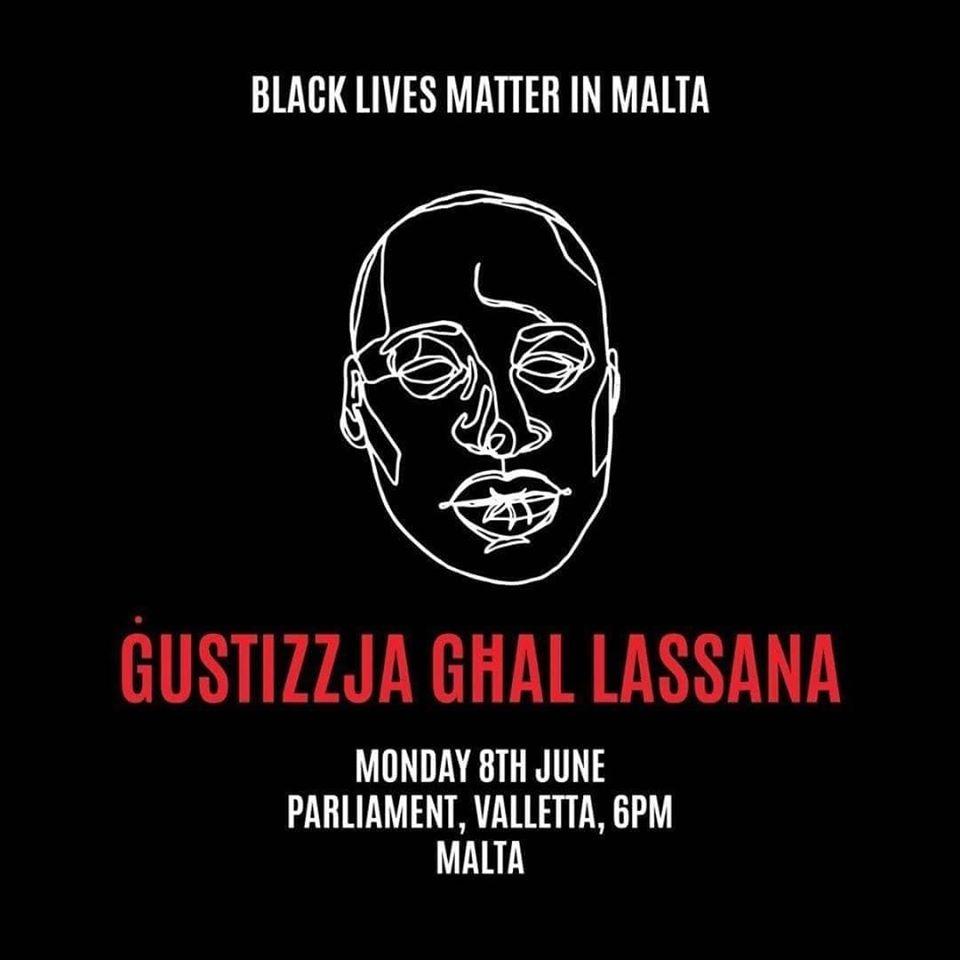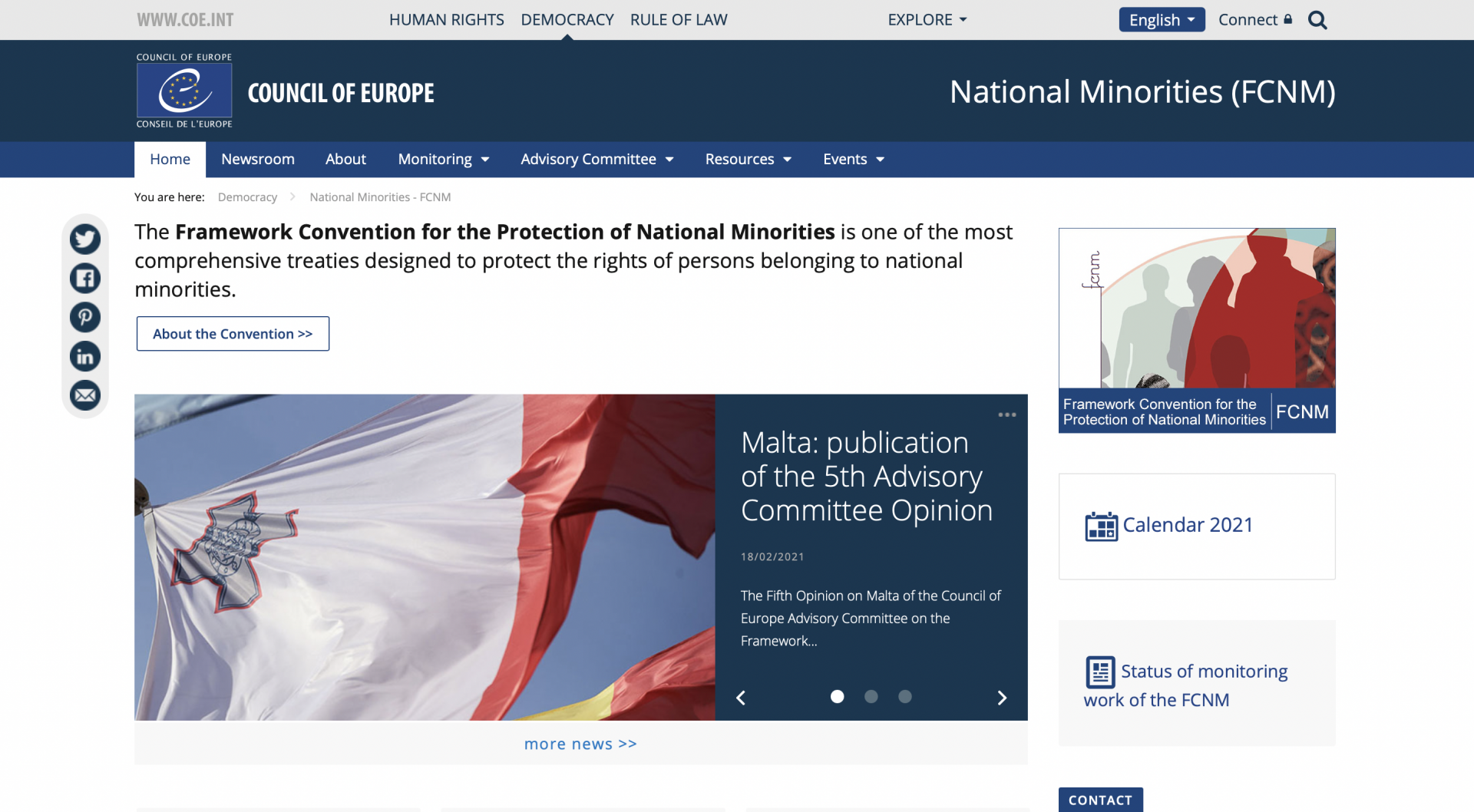Fifth Opinion of Malta of the Advisory Committee on the Framework Convention for the Protection of National Minorities, Council of Europe, 18 February 2021
The Advisory Committee on the Framework Convention for the Protection of National Minorities rendered its Fifth Opinion of Malta, despite the absence of a state report and a country visit. The conclusions and recommendations reflect Malta’s long-standing political, cultural and social issues regarding integration, discrimination, hate crime and hate speech.
‘No national minorities in Malta’?
Under the scope of the Council of Europe, national minorities are meant to be protected by the Framework Convention for the Protection of National Minorities (FCNM). This is a legally binding document adopted in 1994 that Malta signed in 1995 and ratified in 1998. It is currently in force in 38 other states.
By signing and ratifying the FCNM, Malta committed to “respect, ensure the protection of national minorities, to promote full and effective equality of persons belonging to minorities in economic, social political, public and cultural” spheres as well as to ensure their “freedom of assembly, association, expression, thought, conscience, religion, access to and use of the media, linguistic freedom and right to education”.
Article 3 of the FCNM provides for the possibility for individuals to decide whether they wish to be acknowledged as belonging to a national minority. Nonetheless, this Fifth Opinion on Malta underlines Malta’s stance that ‘there are no national minorities in Malta’. It expresses concerns about the effective possibility for individuals to receive information regarding that issue and to answer questions on their ethnic affiliation through population censuses. The Opinion states that introduction of questions regarding religion and race in the next national census is not adequate to reflect the cultural diversity within the Maltese population.
Discrimination, hate crime, hate speech and integration of migrants: a need for systematic collection of data to assess the scale of longstanding issues
As already flagged by the European Commission against Racism and Intolerance (ECRI) in its last report on Malta in 2018, the Advisory Committee encourages the authorities to systematically collect data regarding hate crime incidents and the application of criminal law provisions against racism. It also recommends that this data be made publicly available.
In 2018, ECRI had expressed concerns about the gap between the views of Maltese authorities on hate crime and speech, and NGO reports focusing on numerous cases of unreported incidents against asylum-seekers and refugees, largely due to mistrust of the police. ECRI had commented that the absence of data collection tends to undermine the evaluation of the effectiveness of laws, provisions and policies and gives the impression that this type of crime is not taken seriously.
A transparent and publicly available monitoring of such racist acts is all the more essential considering intolerable tragedies such as the murder of Lassana Cisse. In April 2019 Lassana was shot dead by two soldiers of the Armed Forces of Malta, currently facing trial.

Hate crime and speech nourish the lack of integration and the inverse is just as true. In the past two years, two studies have outlined that a significant amount of Sub-Saharan African immigrants suffer from discrimination in employment, in public spaces and in their personal life.
In 2020, a study led by the University of Malta showed that one in three people would find it “absolutely unacceptable” if an African migrant married a member of their family. Despite the 2017 attempts with the National Migrant Integration Strategy, the Action Plan, the creation of an Integration Unit, the inter-ministerial coordination body and consultative forum, the Council of Europe’s Advisory Committee highlights remaining obstacles for an improved integration of exiles in Malta – whether migrants, asylum-seekers or refugees – in accessing employment, private rented accommodation and other services.
As a consequence, the Advisory Committee urges the Maltese authorities to adopt an Equality Act and a Human Rights and Equality Commission Act. Work on these laws started in December 2015 but has not yet been completed, due to complications on specific aspects of the proposed legislation.
The answer Malta provided to the Advisory Committee comes as a disappointment. Furthermore, As for the fourth Round Evaluation, no information was provided by Malta as to whether it had taken any action on the recommendations made in the Fourth Found Evaluation.

